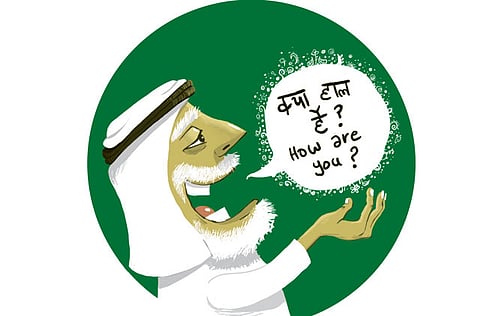I speak for my multilingual city
The local language is an open invitation to experience the richness of community life in Dubai

In Doha, Manama, Jeddah and Riyadh, expatriates are conversant in Arabic — the language of cultural exchange and official protocol. But not so in Dubai. Why though? Surely expatriates in those cities are not smarter, better, or more culturally aware?
Those cities are immeasurably difficult to negotiate if one does not speak Arabic. Here, most of us will never need to acquaint ourselves with the fluid beauty and nuance of the local language to survive.
Economic migrants to other cities find their opportunities improving on learning the local language. I'd love to see how a non-English speaker would manage in the UK, or how one not knowing a word of French would fare in the land of fine bread and cuisine. For that matter, not knowing Urdu would probably make one fairly miserable in Lahore or Karachi.
The Emirati example
But Emiratis, you see, speak the lingua francas: English, Hindi, Farsi, and a smattering of Malayalam; all the languages needed for commerce and basic interaction. And expatriates, in our complacency, expect them to. But an assumption that the locals of a country should speak our languages, and not vice versa, reeks of naivety at best and outright hubris at worst. It all seems a bit colonial, and an imposition rather than a conversation.
In many ways, most of us have fallen into the trap of treating Dubai as a marketplace. We want to earn well, spend well, and perhaps even save a fils or three. We've forgotten that the Dubai of old — from plentiful anecdotal evidence — was also a beautiful place to call home. For many, self included, contemporary Dubai still is.
If we consider the city a mere commercial playground, our decisions will hinge only on the obvious calculus of cost and return. And Dubai's polyglot nature will lull us into not knowing a word of Arabic. The few procedures requiring the language can be outsourced to the company PRO, while we trawl on searching for that next big promotion. Yet this mathematical equation is myopic. It doesn't factor in the value of community, interaction and better quality of life.
Of late, there has been much conversation on the need to protect Emirati traditions and culture. Many Emiratis seem taken aback by the slew of people who have set their sights on Dubai in past years. Relations between Emiratis and expatriates have been strained in ways not seen before, because we've grown far and fast and are just not talking. If we spoke the language and knew the Khaleeji dialect, we would not be outsiders perceived as contributing to cultural erosion. Rather, we would share in the same culture and, in doing so, contribute to its progression and preservation. High cultures have always grown through sharing, not isolation. But this requires a common willingness to disseminate on the one hand and comprehend on the other.
Dubai now needs a sense of community to complement its robust infrastructure and gleaming edifices: one involving both expatriates and Emiratis. Gone is the gold rush, and the arbitrary keeping up with the Joneses. The new Dubai, like the pre-2003 version, is once again a place to live and not just play. Not that I was witness to the halcyon days of the '90s and early 2000s. Born in Lahore, Pakistan, I cut an erratic swathe through the globe to land on Dubai's hectic shores circa 2004. I am neither Emirati, nor Arab, but do like to consider myself Dubiyan. I remain here because I like Dubai, and choose to be positively involved in its community to the best of my ability.
Yet I too am guilty of complacency. I tried learning Arabic once, but after failing in that attempt, moved on to other things. There are a million and one justifications for not continuing and some might ring true.
Enough of excuses
But enough excuses. Enough of the mutual suspicion. Enough too of expatriates and Emiratis neither meeting nor conversing. The recently conducted AIESEC UAE Talks at Zayed University started a brilliant process of communication between Dubai's locals and expatriates. The result was the birth of UAEXchange, a programme relying on social media tools like twitter for both sides to share views and request information. UAEXchange is a community initiative born of a genuine desire to get the people of this city to converse, and do so in both Arabic and English.
On a personal note, I aim to be conversant in Arabic, preferably the Emirati dialect, by the middle of next year. It not only makes ethical and moral sense, but I suspect will also immeasurably improve the richness of my life here. I want know my city's original tongue in addition to its newer ones.
Hisham Wyne is a columnist and copywriter who is fascinated by arts, culture and community, and also writes on global socio-political issues.



